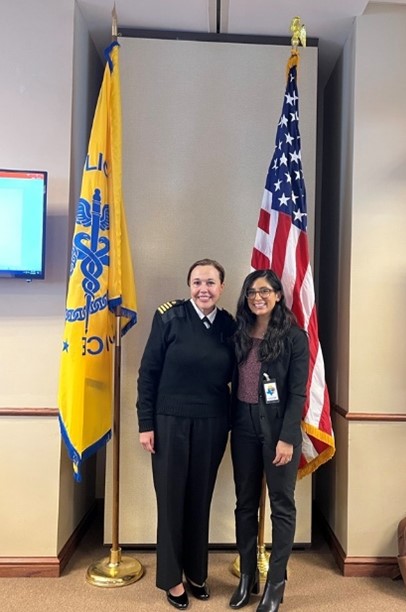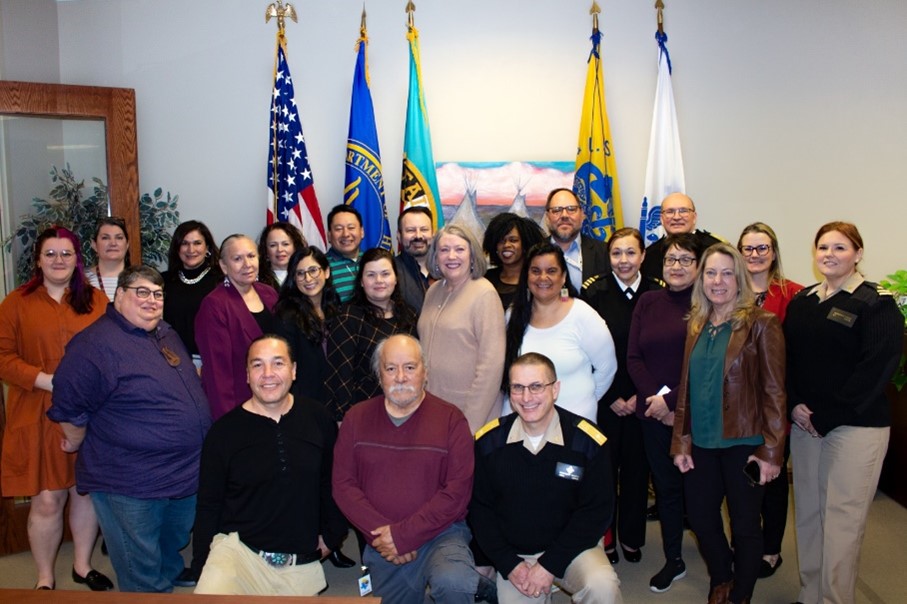NCUIH Participates in SAMHSA’s Native Veterans Expert Panel Discussion
On February 15-16, 2023, the National Council of Urban Indian Health (NUCIH) Federal Relations Manager, Alexandra Payan, represented NCUIH at the Substance Abuse and Mental Health Services Administration’s (SAMHSA) American Indian and Alaska Native (AI/AN) Veterans Expert Panel Discussion. The purpose of this two-day meeting was to have a collaborative conversation around the development of a virtual training tool related to AI/AN military and veteran suicide prevention. The proposed tool will be available for states, territories, and communities to use as they work to implement their efforts. NCUIH was invited to participate in the Expert Panel Discussion to provide insight on the unique needs of AI/AN veterans who reside in urban areas.
Expert Panel’s Work to Support the Governor’s Challenge
 The Expert Panel Discussion was an opportunity to ensure broad representation of AI/AN veterans in the Governor’s Challenge to Prevent Suicide Among Service Members, Veterans, and their Families (Governor’s Challenge). Through collaboration with the VA, SAMHSA and SAMHSA’s SMVF Technical Assistance Center, the Governor’s Challenge seeks to provide a forum for teams to consider how existing policies, practices, infrastructure, and resources influence the effectiveness of the systems that support SMVF. Teams develop state and territory-wide plans based on a comprehensive public health approach and the National Strategy for Preventing Veteran Suicide (National Strategy). During the Expert Panel Discussion, the team engaged in initial steps to develop a virtual toolkit aimed at addressing suicide in AI/AN veteran communities to supplement the Governor’s Challenge. Once created, the virtual toolkit will serve as instruments of change, providing a best-practice public health model that demonstrates meaningful results in suicide prevention for AI/AN veterans.
The Expert Panel Discussion was an opportunity to ensure broad representation of AI/AN veterans in the Governor’s Challenge to Prevent Suicide Among Service Members, Veterans, and their Families (Governor’s Challenge). Through collaboration with the VA, SAMHSA and SAMHSA’s SMVF Technical Assistance Center, the Governor’s Challenge seeks to provide a forum for teams to consider how existing policies, practices, infrastructure, and resources influence the effectiveness of the systems that support SMVF. Teams develop state and territory-wide plans based on a comprehensive public health approach and the National Strategy for Preventing Veteran Suicide (National Strategy). During the Expert Panel Discussion, the team engaged in initial steps to develop a virtual toolkit aimed at addressing suicide in AI/AN veteran communities to supplement the Governor’s Challenge. Once created, the virtual toolkit will serve as instruments of change, providing a best-practice public health model that demonstrates meaningful results in suicide prevention for AI/AN veterans.
Urban Indian Organizations and Native Veteran Support
Sadly, AI/AN veterans have a higher prevalence of mental health disorders compared with White veterans and among all veterans the prevalence of suicidal ideation is highest for those reporting a diagnosis of depression, anxiety, or post-traumatic stress disorder. While there is limited data and research on suicide among AI/AN veterans, the 2020 National Veteran Suicide Prevention Annual Report documents growing AI/AN veteran suicide rates from 2005-2018.
UIOs are essential partners in serving AI/AN veterans and reducing AI/AN veteran suicides. UIOs are critical in improving care and access to services for AI/AN veterans because of their deep ties to the AI/AN community in urban areas. UIOs currently serve seven of the ten urban areas with the largest AI/AN veteran populations, including Phoenix, Arizona; Los Angeles, California; Seattle, Washington; Dallas, Texas; Oklahoma City, Oklahoma; New York City, New York; and Chicago, Illinois. Many AI/AN veterans prefer to receive care at IHS facilities, or may only have access to an IHS, Tribal, or UIO facility.
UIOs are uniquely positioned to assist agencies, such as the VA, SAMHSA, and HHS, in improving health care access for AI/AN people. Several UIOs already provide mental health and substance abuse disorder services and all UIOs provide numerous other social and community services to AI/ANs living in urban areas. NCUIH looks forward to continuing to work with SAMHSA, VA, and other agencies to improve the quality of care available to Native veterans in urban areas.
NCUIH’s work with the VA and Native Veterans in Urban Areas
NCUIH continues to work on behalf of Native veterans living in urban areas to ensure that they have access to the high-quality, culturally competent care the country owes to them for their military service and as a result of the trust responsibility.
For more information on NCUIH’s efforts please visit:
- President Announces Interagency Initiative to Address Homelessness for Urban Native Veterans
- Congressional Hearing Showcases Urgency of Stabilizing Indian Health Service Funding for Native Veterans
- VA Expands Health Care Eligibility for Veterans under the PACT Act, Native Veterans Encouraged to Check Eligibility for Benefits
- Department of Veterans Affairs Seeking Nominations for IHS Billings Area Committee Member for the Advisory Committee on Tribal and Indian Affairs
- NCUIH Submits Comments to the Department of Veterans Affairs on a New Medical Residency Pilot Program
- Department of Veterans Affairs Seeks Comments on Tribal Representation Expansion Project and Designation of Individuals to Represent AI/AN Veterans in VA Benefit Claims
- MOU Between the VA and IHS Updated to Improve the Health Status of AI/AN Veterans and Include UIOs








Leave a Reply
Want to join the discussion?Feel free to contribute!